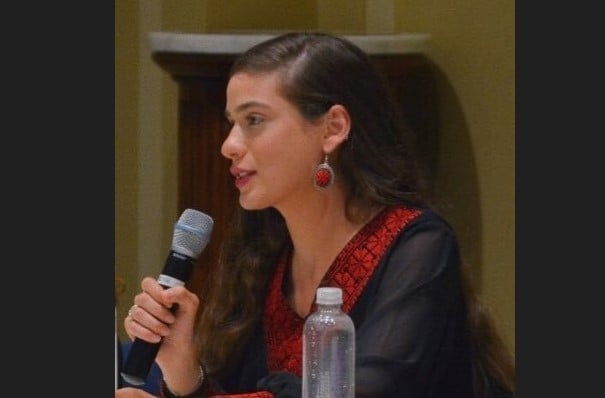Hiba Yazbek, a former intern for Rashida Tlaib, called herself a victim of Israel’s “mental occupation” and said Palestinians are a “minority in our own land” in a 2020 speech.
By Alana Goodman, Washington Free Beacon
The latest hire in the New York Times‘ Jerusalem Bureau doesn’t exactly have a history of scrupulous objectivity when it comes to the Israeli-Palestinian conflict. Hiba Yazbek, a former intern for Israeli-bashing Rep. Rashida Tlaib (D., Mich.), called herself a victim of Israel’s “mental occupation” and said Palestinians are a “minority in our own land” in a 2020 speech.
Yazbek, who joined the Times as a news assistant last week, deleted similar comments she had posted on Twitter, as well as posts in which she condemned Israel for killing terrorists, according to the media watchdog group Honest Reporting.
Although Yazbek deleted a number of her politically charged posts, she still has a photo of her sitting next to squad member Rep. Alexandria Ocasio-Cortez (D., N.Y.) as her Twitter background. Another photo posted on Twitter shows Yazbek posing with Tlaib. Yazbek interned in 2019 for Tlaib—one of the most vocal anti-Israel members of Congress who has accused the Jewish state of “apartheid.”
The hire is likely to fuel concerns about Times reporting on the Middle East conflict, which pro-Israel watchdog groups claim is deeply skewed against the Jewish state. In 2019, the Times was forced to apologize after publishing an anti-Semitic cartoon that depicted then-Israeli prime minister Benjamin Netanyahu as a dog with a Star of David on his collar, leading a blind President Donald Trump who was drawn wearing a yarmulke.
The outlet also caught flak for publishing a glowing portrayal of Louis Farrakhan and a lengthy interview with Alice Walker that failed to mention their anti-Semitism in 2020. That same year, Times opinion editor Bari Weiss stepped down and said she had faced harassment from colleagues over her support for Israel.
Anti-Israel media bias hasn’t been confined to the Times. Last year, the Associated Press hired an anti-Israel activist who accused Israel of “ethnic cleansing” and helped organize protests against Jewish students traveling to Israel on the Birthright program, the Washington Free Beacon reported. The AP later cut ties with the reporter.
The Times did not respond to a request for comment.
In a speech posted by the Muslim American Leadership Alliance, Yazbek said her father’s family was “forced out of Nazareth due to the occupation” in 1948, the year Israel was founded, and moved to Amman, Jordan. She said her family later moved back to Nazareth and she has Israeli citizenship.
“We are a minority in our own land. We experience micro-aggressions every day,” she said in the speech in 2020. “Living in your own land but feeling like a second-class and third-class citizen your entire life, I would say is a mental occupation, in the very least.”
Yazbek added that her “first goal is to bring awareness” to this plight.
In another Twitter post that has since been deleted, Yazbek denounced Israeli soldiers who shot and killed a Palestinian man after he rammed his car into them at a checkpoint, a common type of Palestinian terror attack that is often followed by the driver getting out of the vehicle and stabbing the victims.
“I can’t stop thinking about Ahmad Erekat’s mother and sister, a bride on her wedding day, waiting for him to pick them up from the salon,” wrote Yazbek. “Could they have ever imagined that he was late because he was lying in the street bleeding to death after getting shot by Israeli soldiers?”
Yazbek also said she was “livid” after Saber Ibrahim Mahmoud Suleiman, a Hamas commander, was killed in an Israeli airstrike, claiming that Israel “murdered” him, according to a still-available Twitter post.
A serious observer, and especially a sober-minded journalist, would be expected to know the difference between ‘murder’ and a legitimate military casualty,” said CAMERA, a pro-Israel media watchdog group that flagged the post. “Yazbek’s comment, in other words, was far from serious, sober, or objective-minded.”
The hire could also raise questions about the paper’s social media policy. Earlier this month, the outlet encouraged its reporters to reduce the time they spend on Twitter, where its journalists are already prohibited from “tak[ing] sides on issues that the Times is seeking to cover objectively.”
The Times updated its social media policy in 2017, stating that its reporters “must not express partisan opinions, promote political views, endorse candidates, make offensive comments or do anything else that undercuts the Times‘s journalistic reputation.”
Executive editor Dean Baquet went further earlier this month, encouraging reporters to “meaningfully reduce how much time you’re spending on [Twitter], tweeting or scrolling” and warning that “our feeds [can] become echo chambers” in a memo.


